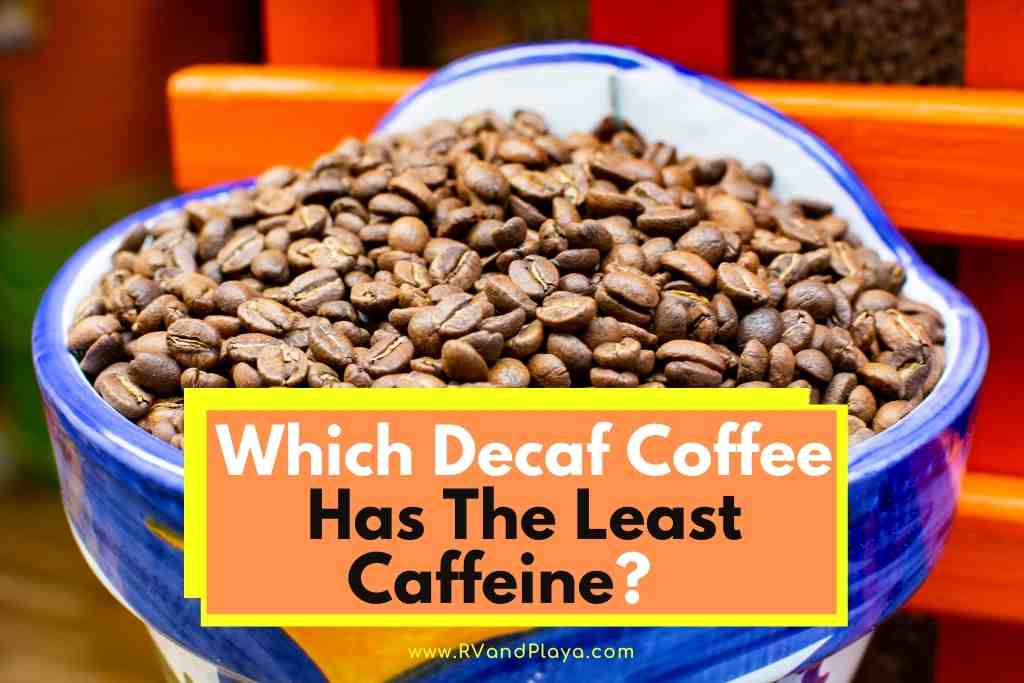Do you know which decaf coffee has the least caffeine? this is one of the questions our readers ask a lot. Well, we´ve got you covered.
If you’re a fan of a good cup of Joe, then you probably search high and low for the best beans. With more than 2 billion cups of coffee consumed each and every day, coffee is the morning staple for many.
For those drinking decaf coffee, any time of day is coffee time!
However, does decaf coffee contain caffeine, and if so, which decaf coffee has the least caffeine?
I have identified 5 Coffee Brands and Stores with the least caffeine which include:
- Percol Fairtrade Delicious Decaf Instant Coffee Natural
- Grumpy Mule Organic Seasonal Decaf Ground Coffee
- Starbucks
- Dunkin’ Donuts Decaf Coffee
- McDonald’s
Nearly all decaf coffee will contain some trace level of caffeine. Decaf processing must remove at least 97% of the caffeine in the US and 99.9% in Europe before it can be considered ‘decaf coffee’.
Darker roasts and instant decaf coffee contain lower levels of caffeine in decaf form.
Table of Contents
Which Brands Have the Least Caffeine in Decaf Coffee?
By law, decaf coffee must be at least 99.9% caffeine-free in Europe as opposed to 97% in the US. Outside of those regions, you’ll find decaf coffee that can be up to 20% caffeinated.
If you’re looking for a low-buzz coffee fix, then head toward a European brand. Ground bean decaf often has around half of the caffeine compared to whole-bean decaf coffee.
So, which brand has the least caffeine?
Percol Fairtrade Delicious Decaf Instant Coffee Natural
Percol is a UK-based coffee manufacturer offering a range of different coffee products. Their decaf offering uses the latest CO2 decaffeination process to extract caffeine to just 0.1%.
It’s also one of the first coffee manufacturers in the world to be endorsed for using fairtrade coffee.
SWP-Decaffeinated After Dinner Blend
Swiss Water Process decaffeinated coffee is made for those who love a good coffee but without caffeine.
They use the swiss water method to extract the caffeine and retain maximum flavor, and they do so without the use of any chemicals.
This coffee is 100% Chemical-Free, 99.9% Caffeine-Free, and gluten free.
Read also: Is Kirkland Decaf Coffee Water Processed?
Grumpy Mule Organic Seasonal Decaf Ground Coffee
Grumpy Mule Organic Decaf ground coffee uses the Swiss Water Process to remove caffeine. It’s a great (although slightly more expensive) variety of decaf, with tasting notes of sweet, smooth chocolate, buttered sourdough, and citrus fruit.
This coffee packs a punch and best of all is certified organic and fairtrade.
Decaf Coffee to Go With the Least Caffeine
Almost everyone loves a good cup of Joe on the go, but knowing how much caffeine you’re getting is really quite tricky.
The rate of caffeine in decaf coffee varies widely from brand to brand, and even from store to store.
Let’s take a look at three of the biggest coffee shops and compare their decaf coffee side-by-side.
Starbucks Decaf Coffee
A 16 fl oz sized cup of Starbucks Decaf Pikes Place coffee has approximately 25mg of caffeine which roughly equates to the 97% benchmark of decaf coffee in the US.
Dunkin’ Donuts Decaf Coffee
A 14–16 oz (414–473 ml) sized cup of Dunkin’s finest decaf coffee will have between 10-14mg of caffeine. This amount varies from store to store.
McDonald’s
A trip to the world’s most loved burger joint has diversified in recent years, and McDonald’s now sells a wide range of delicious steaming coffee options, including decaf coffee.
A 14-16 oz cup of McDonald’s Decaf coffee is likely to contain around 11 mg of caffeine.
How is Decaf Coffee Made?
The process of decaffeinating coffee beans is achieved in a few different ways, all of which slowly strip the caffeine from the coffee grains prior to roasting.
All coffee is brewed from the fermented, roasted, and ground berries of Coffea canephora (Robusta) or Coffea arabica (Arabica).
Typically, Robusta coffee beans will have more caffeine left than Arabica coffee beans after the decaffeination process.
There are a few different methods to remove caffeine from coffee beans:
Direct Method
Also known as the ‘direct organic solvent method’ this involves soaking or steaming the green beans with water and then rinsing them with a solvent (usually dichloromethane or ethyl acetate) that removes the caffeine.
This process is repeated until the desired reduction in caffeine is achieved (minimum 97% in the US and 99.9% in Europe).
Indirect Method
Also known as the indirect organic solvent method’ or ‘water processing’, this method involves soaking the beans in hot water for several hours, and then evaporating the water or using a solvent (dichloromethane or ethyl acetate) to extract the caffeine from the water.
The treated water is then recycled through batches of beans and finds an equilibrium after processing several batches.
Swiss Water Process
This process uses no organic chemicals and only uses water and green coffee extract (GCE) for the caffeine extraction method.
The process of decaffeinating the beans is achieved by placing coffee beans that are still green in hot water, then running the beans and water through an activated charcoal filter to take away the caffeine This process is repeated for several hours until the desired caffeine level is achieved.
Triglyceride Process
Green coffee beans are soaked in hot water or a coffee solution to draw the caffeine to the surface of the beans.
Then the beans are soaked in coffee oils from spent coffee beans to soak for several hours. The triglycerides in the oils remove the caffeine while retaining the flavor of the coffee bean.
Supercritical CO2 Process
Recently, food science has developed a process using supercritical carbon dioxide as a means of decaffeination.
This complicated procedure involves heating CO2 and adding green coffee beans with water. The caffeine gradually dissolves into the CO2 and caffeine is scrubbed using additional water.
The result is a full-flavored coffee taste with only trace amounts of caffeine.
Read also: How Much Caffeine is in Kirkland Decaf Coffee
Summary
For coffee lovers all around the world, finding a good cup of decaf coffee with low caffeine and a full flavor is important.
It’s worth mentioning that there is no ZERO caffeine coffee available, although this may change in the future.
The lowest caffeinated coffee is usually with coffee brands and products from Europe, as by law 99.9% of the caffeine must be removed before it is considered for sale as decaf coffee.
If you’re in the US, then the US-FDA considers coffee that is 97% caffeine-free to be considered decaf.
Here are some of my favorite services, products, and Stores
There are affiliate links, so if you do decide to use any of them, I´ll earn a small commission. But in all honesty, these are the exact what I use and recommend to everyone, even my own family.
To see all my of most up-to-date recommendations, check out this resource that I made for you!
+ Products & Services
+ Convenience Stores
+ Save Thousands of Dollars
References
https://www.percol.co.uk/faqs/
https://www.baltcoffee.com/catalog/swiss-water-process-decaf-coffee
Recent Posts
Do you know how much caffeine is in decaf black tea? this is one of the questions our readers ask a lot. Well, we´ve got you covered. Decaffeinated tea may have anywhere between 2 milligrams and...
If you are a coffee lover, you probably track where you can get the best beans and grinds in town. It may surprise you, though, to find out that you could just buy your coffee at Costco. Kirkland...


